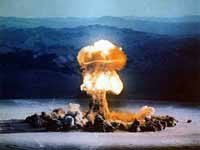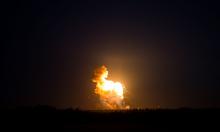USA to resume nuclear tests to save its Cold War stockpile from decline
US Defense Secretary Robert Gates believes the United States needs to resume its nuclear tests. The US needs to take steps to transform an ageing and very expensive complex of nuclear weapons from the Cold War era to a smaller and less costly enterprise that could meet the nation’s security needs for the future.

He said the current nuclear stockpile has been re-engineered to extend its life span, but such extensions cannot continue indefinitely. Without a modernization program, Gates said, the long-term outlook for the arsenal is "bleak."
"No one has designed a new nuclear weapon in the United States since the 1980s, and no one has built a new one since the early 1990s," he said. "To be blunt," Gates said, "there is absolutely no way we can maintain a credible deterrent and reduce the number of weapons in our stockpile without resorting to testing our stockpile or pursuing a modernization program."
The US National Nuclear Security Administration has lost a quarter of its personnel since the middle of the 1990s. A half of US nuclear scientists are over 50 years of age, whereas young specialists have never been involved in the development of nuclear arms. In addition, the USA has not been holding nuclear tests since 1992.
"Currently, the United States is the only declared nuclear power that is neither modernizing its nuclear arsenal nor has the capability to produce a new nuclear warhead," Gates said. Britain and France have programs to support their potentials, whereas China and Russia harbor ambitious plans to develop new weapons, he added.
Robert Michael Gates (born September 25, 1943) is currently serving as the 22nd United States Secretary of Defense. He took office on December 18, 2006. Prior to this, Gates served for 26 years in the Central Intelligence Agency and the National Security Council, and under President George H. W. Bush as Director of Central Intelligence. Before he joined the CIA, he served with the United States Air Force (USAF). After leaving the CIA, Gates became president of Texas A&M University and was a member of several corporate boards. Gates also served as a member of the Iraq Study Group, the bipartisan commission co-chaired by James A. Baker III and Lee Hamilton, that has studied the Iraq War. He was also the first pick to serve as Secretary of the Department of Homeland Security when it was created following the September 11, 2001 attacks, but he declined the appointment in order to remain President of Texas A&M University.
Gates accepted the nomination as Secretary of Defense position on November 8, 2006, replacing Donald Rumsfeld. He was confirmed with bipartisan support. In a 2007 profile written by former National Security Adviser Zbigniew Brzezinski, Time named Gates one of the year's most influential people
Subscribe to Pravda.Ru Telegram channel, Facebook, RSS!





